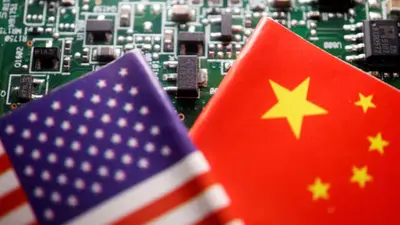Beijing announced on Tuesday that it would restrict exports of key semiconductor components, and other key high-tech materials with potential military applications, to the United States, following Washington’s recent curbs targeting China’s advanced chip production capabilities.
Among the materials banned from export are gallium, antimony, and germanium, according to a statement from China’s Commerce Ministry, which cited “national security” concerns.
Exports of graphite, another critical material, will also face “stricter reviews of end-users and end-uses,” the ministry stated.
“To safeguard national security interests and fulfil international obligations such as non-proliferation, China has decided to strengthen export controls on relevant dual-use items to the United States,” Beijing said.
The statement warned that “any organisation or individual in any country or region violating the relevant regulations will be held accountable according to the law.”
This move follows Washington’s latest measures on Monday, which imposed restrictions on sales to 140 companies, including Chinese chip firms Piotech and SiCarrier, without additional authorisation.
Naura Technology Group, a manufacturer of chip production equipment, is also affected, according to the US Commerce Department.
The ratcheting up of trade restrictions comes as President-elect Donald Trump has been threatening to sharply raise tariffs on imports from China and other countries, potentially intensifying simmering tensions over trade and technology.
China’s Foreign Ministry also issued a vehement reproof.
“China has lodged stern protests with the U.S. for its update of the semiconductor export control measures, sanctions against Chinese companies, and malicious suppression of China’s technological progress,” Lin Jian, a Chinese Foreign Ministry spokesperson, said in a routine briefing Tuesday.
“I want to reiterate that China firmly opposes the U.S. overstretching the concept of national security, abuse of export control measures, and illegal unilateral sanctions and long-arm jurisdiction against Chinese companies,” Lin said.
China said in July 2023 it would require exporters to apply for licenses to send to the U.S. the strategically important materials such as gallium and germanium. In August, the Chinese Commerce Ministry said it would restrict exports of antimony, which is used in a wide range of products from batteries to weapons, and impose tighter controls on exports of graphite.
After the U.S. side announced it was adding 140 companies to a so-called “entity list” subject to strict export controls, China’s Commerce Ministry protested and said it would act to protect China’s “rights and interests.” Nearly all of the companies affected by Washington’s latest trade restrictions are based in China, though some are Chinese-owned businesses in Japan, South Korea and Singapore.
READ ALSO: US Court Rejects Elon Musk’s $55.8bn Tesla Pay Deal
Both governments say their respective export controls are needed for national security.
China’s government has been frustrated by U.S. curbs on access to advanced processor chips and other technology on security grounds but had been cautious in retaliating, possibly to avoid disrupting China’s fledgling developers of chips, artificial intelligence and other technology.
Various Chinese industry associations issued statements protesting the U.S. move to limit access to advanced chip-making technology.
The China Association of Automobile Manufacturers said it opposed using national security as a grounds for export controls, “abuse of export control measures, and the malicious blockade and suppression of China.”
“Such behavior seriously violates the laws of the market economy and the principle of fair competition, undermines the international economic and trade order, disrupts the stability of the global industrial chain, and ultimately harms the interests of all countries,” it said in a statement.
The China Semiconductor Industry Association issued a similar statement, adding that such restrictions were disrupting supply chains and inflating costs for American companies.
“U.S. chip products are no longer safe and reliable. China’s related industries will have to be cautious in purchasing U.S. chips,” it said.
The U.S. gets about half its supply of both gallium and germanium metals directly from China, according to the U.S. Geological Survey. China exported about 23 metric tons (25 tons) of gallium in 2022 and produces about 600 metric tons (660 tons) of germanium per year.
The U.S. has deposits of such minerals but has not been mining them, though some projects underway are exploring ways to tap those resources.
The export restrictions have had a mixed impact on prices for those critical minerals, with the price of antimony more than doubling this year to over $25,000 per ton. Prices for gallium, germanium and graphite also have mostly risen.


